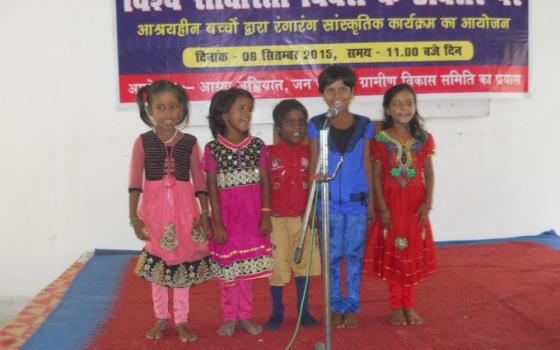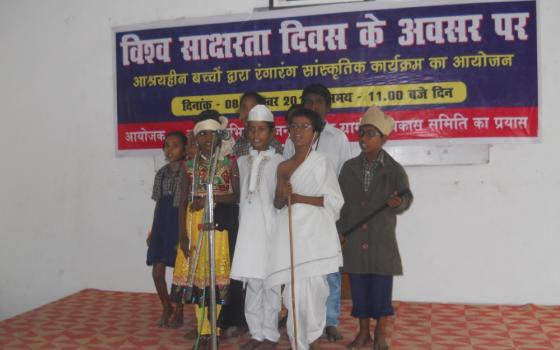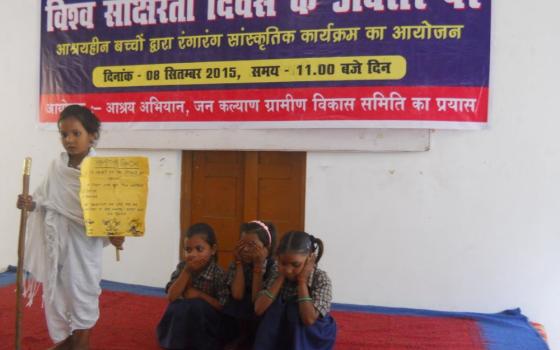What it means to be illiterate for the teeming Indians in our country is no one’s guess. For most of us it is unbelievable that even today, the literacy rate in India is 74 percent, and in the state of Bihar, where we are located, it’s just 63.8 percent.
In India, women and men are denied the opportunity to go to school for a variety of reasons. For example, they could have been denied their childhood to become bread winners for their families or have run away from home due to sheer hunger. The list can go on and on. Stop to think what would happen if you and I who are reading this piece would have been illiterate. We would be denied information and so become powerless — as information is power.
As an organization, Aashray Abhiyan makes an effort to impart basic education to the economically poor people in urban Patna, the capital of Bihar, and nearby rural areas. On the occasion of International Literacy Day (Sept. 8), we created a platform for our children who study in our learning centers in the urban sector and for our children who study in Nano Gyan Deep Niketan, the primary school in rural Islamganj village, to come and display their talents. In doing so we were trying to help them gain self-confidence and rid themselves of the fear of facing a crowd. We also wanted to give the message that given an opportunity they can be on par with those of their own age group who are privileged. Both in the rural and urban sectors, the situation of those who are less privileged is the same and has to do with caste and class politics.
It was a feast for the eyes as the children came out depicting patriotic values and remembering Gandhi, the father of our nation, when he implored people to speak no evil, see no evil and hear no evil. Others dressed as national leaders and recited their favorite sayings: Gandhi: “Walk the path of non-violence;” Pandit Jawaharlal Nehru: “Chacha Nehru. Lover of children;” Jhansi ki Rani (Queen of Jhansi): “I am ready to be slain but will not bend before the enemies;” Bhagat Singh: “You give me your blood, and I will give you freedom.”
The young children danced to the tunes of national songs incorporating the rich heritage of our country. The little girls enacted the importance of education as they played the role of what happens in school. Last but not least, the teachers performed what happens when women are illiterate, as it happens in rural Bihar. Women do not know how a bank functions and hence get frustrated when they go to the bank for transactions.
What does such a program do for our children? It encourages them to believe in themselves and their gifts and to a great extent prepares them to excel in their gifts. For the teachers it is very rewarding as their tireless efforts with these little ones cost them a lot.
We are grateful to the Almighty for inspiring us to take up the challenge of working with the less privileged. They have unconsciously absorbed the belief that they are good for nothing, as those of the higher class and caste do not desire that the less privileged climb the economic ladder.
We have seen a qualitative change in the minds of women and children once they are able to afford education for their children. So, from a tender age, we are trying to inculcate patriotic values and the need to pursue their education.
As the young children watched with their eyes glued to the stage (where they also performed), they gave a loud and clear message: “We are watching and when the opportunity comes our way, we will display our gifts.” Perhaps as they witnessed the program a lot of them had dreams — dreams to excel in life.
The story of Geeta who lived in Islamganj Village of Maner Block, Patna District, of the state of Bihar in North Eastern India comes to mind. She belonged to the fishing community and she knew of no other life than that of doing the household chores or playing alone while her father was on the boat and her mother was out selling fish to the nearby town. Aashray Abhiyan had taken the challenge to work in this very difficult village which is underdeveloped. There is no accessibility to the town except for walking through the fields, and in the monsoon season, the village gets cut off completely because a canal flows along its edge. When we started working in Islamganj, there wasn’t a single educated girl in the village among this community of approximately 250 families who make their living by fishing and selling fish.
With our regular visits, Geeta got lured into coming to learn. By now she was 10 years and too old to sit among the smaller children; however, with much convincing we managed to get another girl, Chandani, also to accompany her. When she completed Grade 4, we organized a crash course for the two girls along with five boys. They passed Grade 8 and then continued to higher secondary school. Today, both these girls are married and well settled.
There is a big gap between the literacy rate of women and men in India. In Bihar itself where the literacy rate is 63.82 percent, it is 73.5 percent for men but only 53.3 percent for women. Therefore, the huge challenge to bring about a change in the state is to work for the education of the girl child. Women desire that their children have a better life than theirs, as most women regret that they never got an opportunity to study. There is a very strong belief among the people that a woman is an alien property, meaning that her parental house is not her home. Her real home is the home of her husband. When she marries she leaves her parental home and goes to live with the family of her husband, so her own parents are not interested in investing in her education. There has been a gradual change in this mindset, but before this is really changed there are many battles to be fought by individuals and collectives in the state. The young women who are being exposed to the outside world are becoming stronger each day and are prepared to make the changes. What we are doing is offering the backing and giving them the kind of support they need as they break new paths.
Our prayer for these little ones participating in our learning centers is that they will have the courage to go through the storms of life and be responsible adults building a strong and vibrant nation and connected to the wider human family.
[Dorothy Fernandes a Sister of the Presentation of the Blessed Virgin Mary from India. She presently serves as Vice Provincial of the Indian province while continuing to be deeply engaged with the urban poor of Patna, Bihar.]



